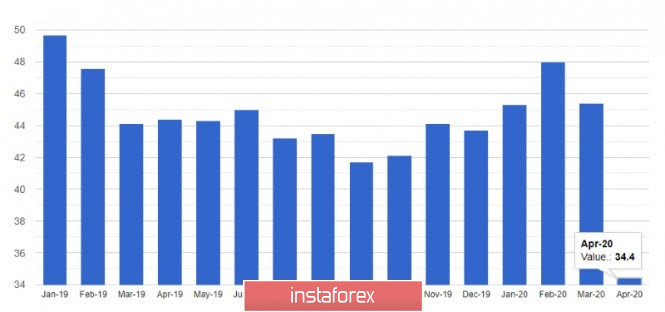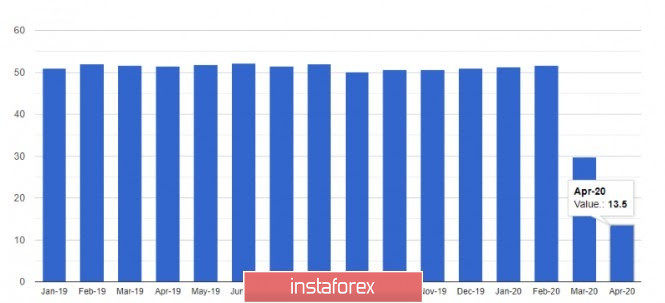Economic activity in the eurozone countries continues to decline at a record pace, and, despite preliminary data, the euro responded by falling against a number of world currencies, while the US dollar continues to strengthen. A particularly large drop was observed in the service sector, which suffered the most due to the spread of coronavirus and is in a very terrible state. Even during the financial crisis, there was no such record drop in performance. Given the quarantine measures that most of the eurozone countries have resorted to, the service sector will continue to decline, so it's too early to talk about bottoming out with indices. Accordingly, all this will affect the general indicator of GDP, which economists have not yet talked about at all, making only general forecasts,

According to the data, the sentiment index in business circles of France in April of this year fell to 82 points against 98 points in March, while its decline was forecasted to reach 91 points. The mood in business circles will continue to decline further, since no one is going to cancel quarantine measures, and it is hard to say when the economy will return to its full functioning.
According to the statistics agency Markit, the preliminary index of PMI procurement managers for the manufacturing sector in France in April this year fell to 31.5 points against 43.2 points in March with a forecast of 37.0 points. As I noted above, the service sector suffered the most, where the preliminary PMI of purchasing managers fell to a record 10.4 points in April against 27.4 points in March and a forecast of 25 points from economists.
Similar indicators in Germany also failed to please traders, although the decline in economic activity in the key eurozone economy is not as strong as in other countries. However, it is also impossible to say that the indicators will not have a negative impact on GDP. The report of the statistics agency indicated that the preliminary index of PMI procurement managers for the manufacturing sector in Germany in April fell to 34.4 points from 45.4 points in March with a forecast of 39.0 points. The service sector collapsed to 15.9 points against 31.7 points in March, with a forecast of 28.6 points.
The leading indicator of consumer sentiment in Germany indicated another drop in the indicator due to the coronavirus pandemic and related isolation measures. According to a report by the GfK research group, the consumer confidence index in Germany in May 2020 fell to -23.4 points from 2.3 points in April after the indicator was revised downward. Economists had expected that in May the indicator would decline only to -1.8. However, Gfk noted that, given the almost complete freezing of the economy, an unprecedented fall was not surprising. The return of the economy to life will lead to a rapid recovery of the indicator.

Data on the economic activity of the eurozone as a whole negatively affected euro quotes. The report indicates that the preliminary index of PMI procurement managers for the manufacturing sector of the eurozone in April dropped to 33.6 points against 44.5 points in May with a forecast of 9.3 points. The preliminary index of PMI procurement managers for the eurozone services sector fell to 11.7 points in April from 26.4 points in March. It is very difficult to talk about when the activity starts to recover, as much will depend on support measures from the European regulator, as well as on the departure of the coronavirus pandemic, which is actively progressing in the EU countries.

The PMI Composite Purchasing Managers Index, which includes services and manufacturing, fell to 13.5 points in April from 29.7 points in March.





















